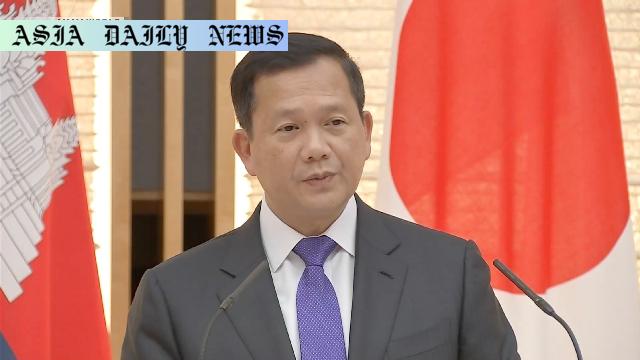Cambodia-Thai Conflict: Malaysian PM Anwar Ibrahim’s proposal for ceasefire faces accusations of rejection and reversal.
Cambodia accuses Thailand of reversing its acceptance of a ceasefire proposal.
Millions are affected as clashes erupt in a disputed border region.
Thailand accuses Cambodia of targeting civilians in hospitals and homes.
Malaysian PM Anwar Ibrahim’s ceasefire proposal remains hanging in balance.

Escalation of Cambodia-Thai Border Tensions
The border conflict between Cambodia and Thailand has reached alarming heights after a series of clashes that began on Thursday. Reports indicate that these skirmishes have primarily erupted in a long-contested boundary area. Civilian casualties on both sides of the border are rising, with civilians caught amidst the crossfire. News reports suggest that at least 14 individuals, including civilians, have lost their lives on the Thai side, with over 40 suffering injuries. Meanwhile, Cambodian authorities report one civilian fatality and five injuries.
Amidst the violence, Malaysian Prime Minister Anwar Ibrahim proposed an immediate ceasefire to de-escalate the tension, bringing hope for resolution. However, the negotiations quickly descended into accusations between the conflicted nations. Cambodia accused Thailand of reversing its acceptance of the ceasefire. Meanwhile, Thai authorities refuted the claims, stating they are willing to consider peace but alleged aggressive actions from Cambodia continued unabated, targeting hospitals and residential areas. These accusations have only exacerbated the distrust between the two nations.
The Role of Malaysia in Mediation
Malaysian Prime Minister Anwar Ibrahim displayed admirable leadership in presenting an immediate ceasefire proposal during the earliest stages of the conflict. While his initiative aimed to avoid further bloodshed, a lack of alignment from both conflicting parties has hindered progress. Anwar has called for international humanitarian principles to be upheld, citing the need to safeguard civilians, hospitals, and residential infrastructure against military aggression from either side.
Despite Malaysia’s efforts, the conflict highlights the intricacies of diplomatic intervention in long-standing territorial disputes. The disputed border between Cambodia and Thailand has seen recurring skirmishes in the past, deeply rooted in historical disagreements. Overcoming distrust and achieving a lasting peace requires commitment and goodwill from regional leaders as well as international organizations. For now, Anwar’s ceasefire proposal awaits further consideration while tensions remain high across the region.
Humanitarian Crisis and International Reactions
The ongoing clash has led to devastating consequences for civilians, who are often the earliest victims during conflicts of this nature. Disturbing reports claim that hospitals and residential areas have come under fire, violating international laws aimed at protecting civilians in conflict zones. Cambodian Prime Minister Hun Manet has voiced concerns over the widening impact of the conflict, expressing frustration that ceasefire proposals have not yielded tangible results.
Thai officials, in the meantime, have doubled down on their accusations against Cambodia, demanding international acknowledgment of cross-border provocations. Humanitarian agencies have expressed deep concern over escalating violence and called for immediate respite for affected families on both sides of the border. As the world watches, international pressure may serve as a key motivator to bring both governments to the negotiating table in good faith.



Commentary
The Importance of Ceasefire in Conflict Resolution
Conflicts such as the one currently unfolding between Cambodia and Thailand underscore the critical importance of maintaining and upholding international peace agreements. The decision by Malaysia, under the leadership of Prime Minister Anwar Ibrahim, to swiftly propose a ceasefire represents a positive and strategic approach to halting violence before it spirals further. However, the allegations of a ‘U-turn’ and continuing skirmishes indicate the challenges of achieving coherence between conflicting narratives.
The Devastating Impact on Civilians
Perhaps the most tragic aspect of this conflict lies in its consequences for civilian populations. Reports of attacks on hospitals and residential areas paint a grim picture of suffering on both sides of the border. These zones should remain protected under international law, and targeting them constitutes a grave violation of humanitarian principles. Governments, particularly those engaged in conflict, must prioritize the safety and preservation of civilian life even during military engagements.
The Need for Regional and Global Support
For a resolution to truly take effect, both Cambodia and Thailand must commit to diplomatic dialogue and build trust to avoid further escalations. At the same time, other regional actors, such as Malaysia, play an essential role in advocating for peace and urging adherence to humanitarian principles. Global organizations such as the United Nations also have a part to play in facilitating impartial negotiations and monitoring adherence to ceasefires should they come into effect. The world must recognize that such regional conflicts have the potential to destabilize larger areas, demanding proactive engagement.
In summary, the Cambodia-Thai conflict serves as a sobering reminder of the delicate nature of cross-border relationships and the omnipresent need for collaborative solutions. The path to peace is never simple, but with coordinated efforts and dedication from all parties involved, a brighter future can emerge from even the darkest times.